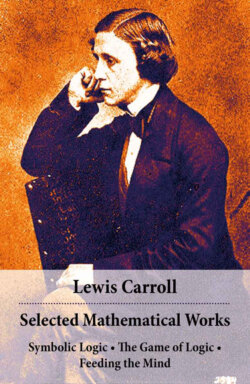Читать книгу Selected Mathematical Works: Symbolic Logic + The Game of Logic + Feeding the Mind: by Charles Lutwidge Dodgson, alias Lewis Carroll - Lewis Carroll - Страница 32
На сайте Литреса книга снята с продажи.
§ 3. A Proposition of Relation, beginning with “All”, is a Double Proposition.
ОглавлениеA Proposition of Relation, beginning with “All”, asserts (as we already know) that “All Members of the Subject are Members of the Predicate”. This evidently contains, as a part of what it tells us, the smaller Proposition “Some Members of the Subject are Members of the Predicate”.
[Thus, the Proposition “All bankers are rich men” evidently contains the smaller Proposition “Some bankers are rich men”.]
The question now arises “What is the rest of the information which this Proposition gives us?”
In order to answer this question, let us begin with the smaller Proposition, “Some Members of the Subject are Members of the Predicate,” and suppose that this is all we have been told; and let us proceed to inquire what else we need to be told, in order to know that “All Members of the Subject are Members of the Predicate”.
[Thus, we may suppose that the Proposition “Some bankers are rich men” is all the information we possess; and we may proceed to inquire what other Proposition needs to be added to it, in order to make up the entire Proposition “All bankers are rich men”.]
Let us also suppose that the ‘Univ.’ (i.e. the Genus, of which both the Subject and the Predicate are Specieses) has been divided (by the Process of Dichotomy) into two smaller Classes, viz.
(1) the Predicate;
(2) the Class whose Differentia is contradictory to that of the Predicate.
[Thus, we may suppose that the Genus “men,” (of which both “bankers” and “rich men” are Specieses) has been divided into the two smaller Classes, “rich men”, “poor men”.]
Now we know that every Member of the Subject is (as shown at p. 6) a Member of the Univ. Hence every Member of the Subject is either in Class (1) or else in Class (2).
[Thus, we know that every banker is a Member of the Genus “men”. Hence, every banker is either in the Class “rich men”, or else in the Class “poor men”.]
Also we have been told that, in the case we are discussing, some Members of the Subject are in Class (1). What else do we need to be told, in order to know that all of them are there? Evidently we need to be told that none of them are in Class (2); i.e. that none of them are Members of the Class whose Differentia is contradictory to that of the Predicate.
[Thus, we may suppose we have been told that some bankers are in the Class “rich men”. What else do we need to be told, in order to know that all of them are there? Evidently we need to be told that none of them are in the Class “poor men”.]
Hence a Proposition of Relation, beginning with “All”, is a Double Proposition, and is ‘equivalent’ to (i.e. gives the same information as) the two Propositions
(1) “Some Members of the Subject are Members of the Predicate”;
(2) “No Members of the Subject are Members of the Class whose Differentia is contradictory to that of the Predicate”.
[Thus, the Proposition “All bankers are rich men” is a Double Proposition, and is equivalent to the two Propositions
(1) “Some bankers are rich men”;
(2) “No bankers are poor men”.]
